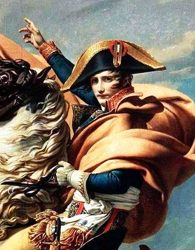Napoleon Bonaparte is known for being a highly ambitious military leader, leading France in conquests throughout the Middle East and Europe, but he was also an innovative political leader, seizing France from the remains of the ancien regime and the disorderly aftermath of the Revolution.
Napoleon Bonaparte’s Early Days
Napoleon Buonaparte (later, Bonaparte) was born on August 15, 1769, on the island of Corsica, which had been defeated by the French three months before his birth. Napoleon’s father Carlo “readily submitted” to the influence of the island’s conquerors, but Napoleon himself “spent his childhood hating France” and “never forgave his father for abandoning his Corsican heritage.” He once wrote: “I was born when [Corsica] was perishing. Thirty thousand Frenchmen spewed on to our shores, drowning the throne of liberty in waves of blood…The cries of the dying, the groans of the oppressed and tears of despair surrounded my cradle from the hour of my birth.” Napoleon arrived in France at the age of nine and was promoted at 15 to the Royal Military Academy in Paris; according to PBS, his ambitions went beyond simply military prowess.
After the French Revolution, Napoleon took a leave of absence from the army and returned to Corsica “an idealistic revolutionary.” He absorbed himself in local politics and established himself as a pro-France leader in opposition to the island’s governor, Pasquale Paoli. The rivalry between the two escalated, ending in Napoleon’s defeat and forced exile from the island. He fled to France with his widowed mother and six siblings at the age of 24 and never returned.
Bonaparte’s Notable Accomplishments
According to website The Flow of History, “interplay of military innovations that made Napoleon a national hero and the longing for a strong, secure government that Napoleon promised” turned Napoleon from a national military hero into the leader of France. After returning to France from Corsica, Napoleon resumed his duties in the French army and quickly asserted himself as a promising leader, recapturing Toulon from the British in 1793 and being appointed general of his brigade soon afterward. Fighting for the French and Italian armies, defending the latter against Austria, Napoleon rose to commander-in-chief of the French army by 1796. What followed were campaigns against Austria and the seizure of Egypt in 1799. By 1801, Napoleon had led the French to victories over Germany and Austria and had seized control over much of Italy, Switzerland and Holland, as well as parts of Germany and Belgium.
Sources in this Story
- PBS: Napoleon: The Man and the Myth
- The Flow of History: Napoleon and his Impact (1799–1815)
- The Napoleon Foundation: The ‘Institut d’Égypte’ and the Description de l’Égypte
- The Napoleon Series: The Civil Code
- The BBC: Empire and Sea Power—The Battle of Waterloo
The Napoleon Foundation notes that although he chose to focus on his military duties, Napoleon was extremely interested in the sciences. Fortunately, with military success came more power and influence in academia. He was elected to the Institut de France, an organization made up of five academies, in 1797. He “had been elected (at his own request) as a result of his success in the Italian campaign, not for any scientific or artistic success. But amongst the academic elite of the country, Bonaparte was happy to follow humbly.” During his campaign in Egypt, he founded the Institut d’Égypte, which, among other accomplishments, claimed the discovery of the Rosetta Stone.
In the transition from purely military leader to political leader, Napoleon established the Civil Code, one of his greatest contributions to France. The French Revolution had overturned many of the hundreds of codes established by the country’s ancien regime, and the Civil Code put in place a new order of French laws that would have a lasting influence in France and many other countries. The Napoleon Series calls them as a “typically Napoleonic mix of liberalism and conservatism,” focusing on “equality before the law, freedom of religion and the abolition of feudalism.” The laws also “reinforced patriarchal power by making the husband the ruler of the household.”
The Rest of the Story
Napoleon established a military dictatorship in France in 1799. His official title was First Consul until 1804, when he was crowned Emperor of France. By this time, France was already entrenched in war with Britain and Napoleon’s era was coming to a drawn-out end. Napoleon had long intended to capture Britain, which he called “the most powerful and most constant…of my enemies.” Britain declared war on France in 1803 during a time of relative stability on the continent, and fought against Napoleon alongside its allies for 11 years. In 1814, Napoleon was forced to accept defeat and sign the Treaty of Fontainbleau. Napoleon was then exiled to the island of Elba, but was motivated to return in 1815 by Louis XVIII’s unpopularity. Marching on Paris, the city from which he had previously ruled, Napoleon was defeated by the British and Prussian armies at the Battle of Waterloo. He was exiled again, this time to the remote island of St. Helena, where he spent the rest of his life until he died on May 5, 1821.
This article was originally written by Liz Colville; it was updated July 17, 2017.











